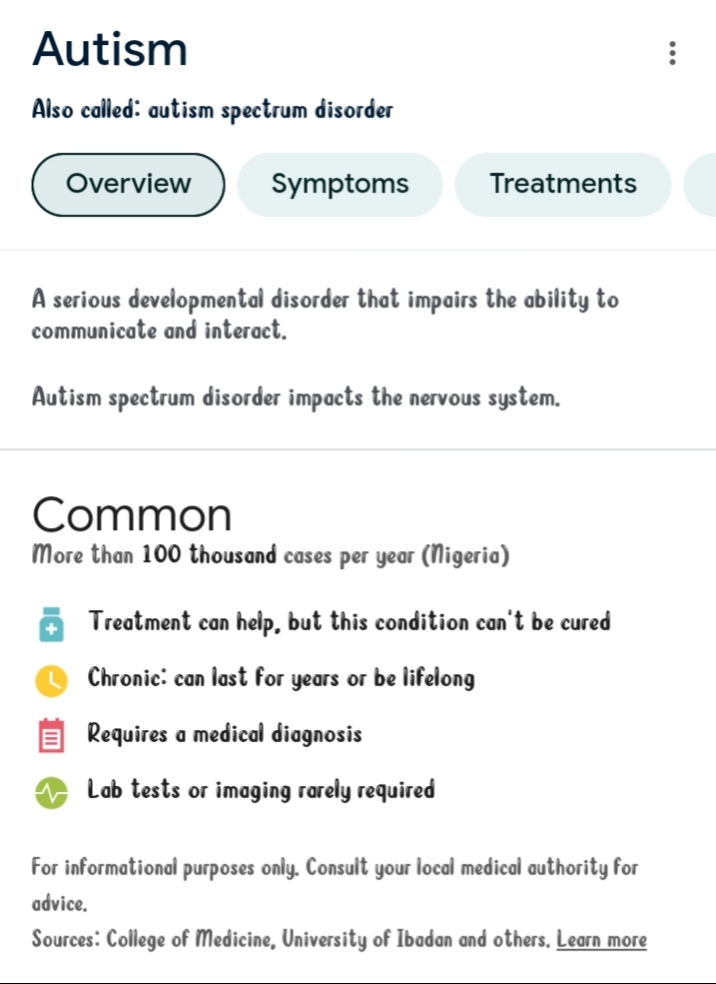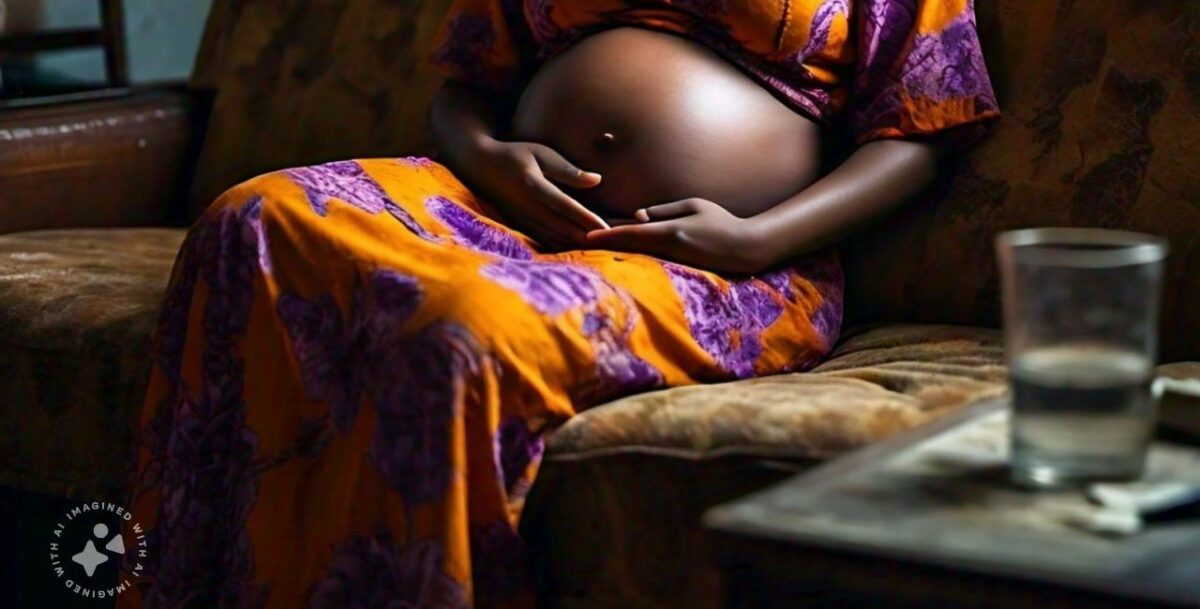It is hard to find parents who were relieved to learn that their child had a developmental disorder. But you would be relieved if this diagnosis meant that, after years of fruitless attempts to figure out what was wrong with your child, you could now provide them with the proper care. Imagine now that you had to cope with ongoing criticism from the public following the diagnosis, with people holding you accountable and passing judgment on your child’s illness. ABIMBOLA ABATTA interviews the mother of a child with multiple developmental conditions for this FIJ report.
When her 19-year-old son was diagnosed with autism more than a decade ago, Rafat Salami, an Abuja-based journalist, was very happy. For her, the diagnosis brought relief and a semblance of hope after years of unsuccessful attempts to know the nature of her son’s condition.
Autism, also called autism spectrum disorder, is a developmental disorder that affects the ability to communicate and interact. It is often characterised by difficulties with communication and social interactions, obsessive interests and repetitive behaviours. Although autism has no known cure, it can be managed.
Experts reveal that a child with autism could either be verbal or non-verbal. Children with non-verbal autism use movements, sounds and body language instead of speech to communicate.

Salami’s son was diagnosed when he was between five and six years old. It had been extremely frustrating for her running from pillar to post in an attempt to figure out what was wrong with her kid, who was not meeting developmental milestones or performing tasks that were appropriate for his age.
“I knew he was different,” Salami told FIJ.
“Doctors did not have the answers. They did not know what tests to conduct. He didn’t walk on time. Even when he was, he was tripping and falling everywhere and not walking straight. And we didn’t have a diagnosis. We did not know what was wrong with him.
“When I finally got an assessment and got a diagnosis, I was very happy. At least with the diagnosis, we would now have interventions and management plans. With autism, there’s no treatment plan; it is a management plan. So, the diagnosis meant I knew what I was contending with.
“It was a big relief to know that he had autism, attention deficit hyperactivity disorder (ADHD), cerebral palsy, and mild intellectual disability. These were the four things I was told. But the key thing was we then knew what we were contending with. I was very pleased that, at least, he fell into a category because if he didn’t fall into a category, we would have continued to probe.”
READ ALSO: ‘For His Disability, KFC Humiliates Ex-Governor Gbenga Daniel’s Son at Lagos Airport’
BEFORE AND AFTER DIAGNOSIS
Prior to the diagnosis, a typical night for Salami was rough and filled with hurdles that had to be surmounted. If her child did not sleep well, she would not sleep well. But thanks to diagnosis, she told FIJ, the exhaustion has reduced.
“When it comes to autism care, the difference you want to see will not come overnight. It is not like treating malaria, whereby you use antimalarial today and are expected to make a full recovery within three days. The impact of autism care may not even show in a year or three years,” she said.
“Before the diagnosis, we could not sleep well at night because he was not sleeping well. He had this involuntary body movement that even when he was asleep, his body is jerking.
“Sometimes, he held his breath, so you had to be awake to tilt his neck back and put him in a recovery position. You know that recovery position you do during CPR and emergency resuscitation for someone? That was when I knew about it. I had to put him in that recovery position at all times. That means his neck had to be tilted back to allow the free flow of air into his lungs.
“And because he was a baby then, I had to be awake most times to be sure that his neck was tilted back; otherwise, he could stop breathing. There were at least two occasions when his breath stopped that I saw. So, because he didn’t sleep well, we also didn’t sleep well. We would wake up groggy.
“He also didn’t know how to communicate then. To bathe him was a problem, and it was a fight to brush his teeth. Because of the hyperactive disorder, you have to be running after him everywhere he goes. However, that exhaustion has reduced now.”
MISCONCEPTIONS
Having a child who seems different from their peers in Nigeria comes with a truckload of challenges. One is a misconception. According to Salami, a lot of people think autism is spiritual.
“They think a spirit must have entered my stomach or it’s a punishment for the bad things I’ve done in my life. That’s why people will tell me to take my child for deliverance in church,” she said.
“I’m a Muslim, but they tell me to take my child to church for deliverance. Even Muslims tell me to take him for Ruqyah, which also means deliverance or exorcism. It’s because they don’t know better. Traditionalists come to me, too. But if we keep sensitising people, everybody will understand that autism is not spiritual.”
While she believes that people’s minds can change through increased awareness and acceptance, she pointed out that changing the mindsets of others in society starts with parents accepting their children as they are, not as they wish them to be.
“We all have wishes for our children, but unfortunately, they are not who we want them to be. They are who they are. So, we first must accept them for who they are. When we stand firm to protect them, the whole world will bow,” she said.

READ ALSO: 4 Times PWDs Accused KFC of Discrimination in Different Countries
‘EVERYBODY JUDGES YOU’, EXPENSIVE CARE AND OTHER CHALLENGES
Beyond the misconceptions about autism, the greatest challenges Salami has ever faced have to do with acceptance and access to care.
“Everybody judges you. 99.999 percent of people judge you, from family to friends to the workplace, even school. Everybody is judging, telling me I’m not parenting well, telling me this boy jumping up and down is doing that because we are not good parents, but he cannot help himself and I cannot help him,” she said.
“Resources to care for him is a big problem, too,” Salami added.
To adequately care for a child with autism, FIJ learned, parents have to consult different health providers, ranging from speech and occupational therapists to physiotherapists. And the cost of these health professionals is often on the high side.
“You have to pay for every service. When he began speaking around six/seven years, we were told to take him to speech therapy. When I got the bill, I can’t remember exactly how much I was given, but without removing anything from my entire salary at the time, it would not pay for two weeks of speech therapy, and we were going three times a week.
“What I did was pay for one week and watch what they were doing, then I came home and continued. I took him for physiotherapy, too, watched what they were doing and stopped going after two or three times.
“Up till now, he doesn’t like people touching him. Once another hand touches him, he begins to cry. After that, I was doing the physiotherapy myself, and it was even more effective because I had more time, unlike physiotherapists, who will have other people to attend to, and I massaged him more. And because he likes my knees, he would not shout; he’s more cooperative. I’m not saying what they’re doing at the hospital is not right. They were doing an excellent job, but I had the time to care for him because he was always with me.
“The challenges are numerous: access to facilities, access to care, even the knowledge base of these caregivers. We have a dearth of caregivers. There’s so much unemployment, and some of the employed ones don’t even have passion. Some of them will be pinching our children. My son had injuries from the beating he received at some point. So many challenges.”
To make life a lot easier for parents of children with special needs, Salami said that relevant authorities, especially the government, need to increase health insurance coverage. “There are many things, like therapies, not covered under the national health insurance scheme,” she said.
“Many parents don’t take their children for assessment because they cannot afford it.”
‘WE HAVE TO KEEP FIGHTING FOR OUR CHILDREN’
Concerning the stigma and judgment from society, Salami said, “I really don’t care what people say. I have always been a very tough person.”
Because she’s had to fight for herself all her life, she revealed, fighting for her son came easily.
To emphasise the importance of parents advocating for their children, she recalled two past incidents when she had to stand up for her son. The first was at a supermarket, where her son accidentally brushed a female shopper as he was about to get an item that caught his eye. The shopper was infuriated, and despite Salami’s apologies, she demanded an apology from her son.
“I begged her to keep her voice down. In the middle of this, this boy took what he wanted, came to give it to me and unknowingly brushed her again. She screamed. I told her he did not know he’d done anything wrong and that he repeated it because he’s on the autism spectrum and if she raised her voice, I would not be able to control him there.
“When he became conscious of his environment, he began to have a panic attack. He thought I was fighting. His body was shaking; I had to quickly hold him. That was when the woman understood; she was even apologising.”
Salami also had to defend her son when she moved into a new compound. The landlord suddenly backed out and wanted to refund her, but she was not having it. She would later learn that some neighbours did not want her son in the compound.
“It turned into a big disagreement between one of them and me. I fought him every day for three weeks because he told me to my face that I had an imbecile for a child and I should move him out. I told him that my child might have disabilities, but he crossed the red line the moment he used that word,” she said.

This neighbour would later become her son’s best friend.
“A peace meeting was called, and he apologised to me. He said he didn’t know that my son was on the autism spectrum,” she said.
Just as she had to fight for her son, Salami said, parents of children with special needs should be prepared to fight for them. “If you don’t, society will treat your child the way you treat them.”
Nevertheless, she hopes members of society will be more patient and understanding, as judgment and abuse only exacerbate the challenges that confront parents like her.
“The whole world has to be patient and understand that we have our battles, and we are doing the best we can. Judging and abusing us will not solve anything,” she said.
“When you see someone struggling, please open the door. Just make life a little bit easier for us. Don’t just stare and judge us.
“I have gone to check out points in supermarkets and strangers will just clear my bills. Support people raising a child with disabilities in whatever way you can because we need all the help.”
Whenever parenting, combined with other social and daily responsibilities, becomes overwhelming for Salami, she finds comfort in crying. This, according to her, is therapeutic. She also finds relief in writing, resting and getting enough sleep.
“Many of us have nobody we can entrust our children with. This means you have to be there for your child to thrive. And I understand that this journey is not a sprint but a marathon, so I have to be prepared for the long haul. Each stage comes with its challenges because the children are growing,” she said.
‘EARLY DETECTION IS HELPFUL,’ SAYS SPEECH THERAPIST
Helen Ajayi, a speech therapist at the Federal Neuro-Psychiatric Hospital, Aro, Abeokuta, Ogun State, told FIJ that autism is a neurodevelopmental disorder rather than a mental illness.
While autism may not be classified as a mental illness, Ajayi said, some children with autism may have coexisting mental health issues.
Also, according to the speech therapist, the exact cause of autism is not known, but genetics may play a role, meaning it can be hereditary. She, however, explained that early intervention and therapy can help improve communication and social interaction.
Regarding access to care, she acknowledged that treatment is expensive and distance often poses a barrier. “A child with autism will not see a speech therapist alone. The child will have to see an occupational therapist. Some have to see behavioural analysts, nutritionists and physiotherapists, too. When you consider all the medical experts coming in, it is expensive,” she said.
She said a common misconception about autism is that it is somehow linked to spiritual or supernatural causes. “Some people even term it madness, but this is not so. Children with autism often have a high intelligence quotient. There are so many misconceptions that parents and others find it difficult to believe that it is a medical condition.
“Children with autism seclude themselves from others because they prefer to be alone. As therapists, our goal is to encourage social interaction by engaging them in various activities,” she said.
“Autism diagnosis typically occurs from age two and above. Unfortunately, some parents erroneously believe it may be a spiritual issue; hence, they resort to non-medical interventions instead of consulting health professionals. By the time they present the child to the hospital, it is either too late or too difficult to build the child’s communication and social interaction.”
For Ajayi, continuous education and awareness are required to dispel the misconceptions about autism. “Sensitisation programmes, both within the healthcare settings and in the wider community, such as the media, are important because many people don’t even know what autism is all about. And contrary to these misconceptions, autism can be managed,” she said.
Subscribe
Be the first to receive special investigative reports and features in your inbox.















